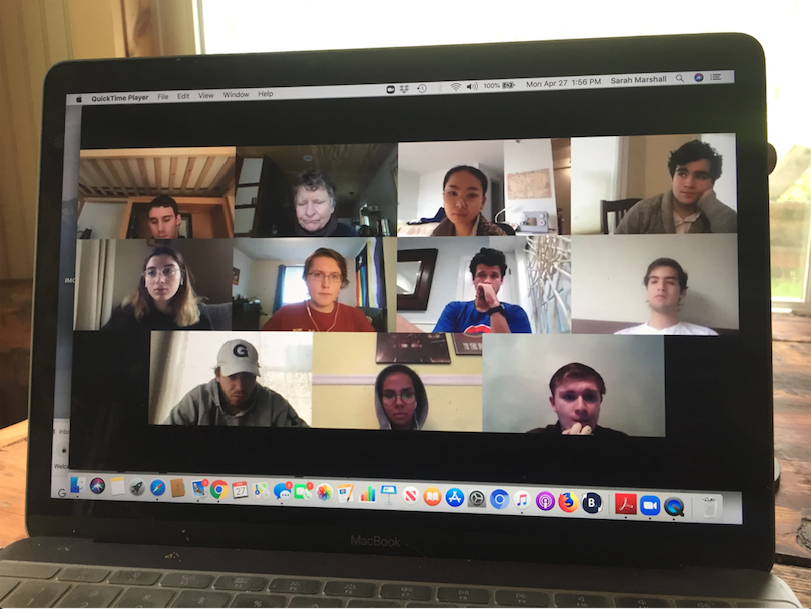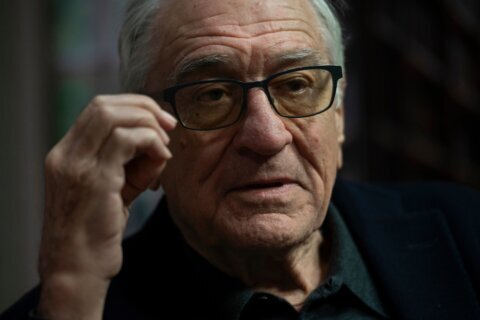
Tuesday marks the last day of classes for Georgetown University’s spring semester, and due to her unique remote teaching, acting students won’t be forgetting Sarah Marshall.
Just weeks ago, she discussed the looming coronavirus with colleague Derek Goldman.
“I stepped into his office a couple of weeks ago because we’re going to teach a class in the fall together,” Marshall told WTOP. “We had just been in a meeting with the deans and management of the school. He said, ‘I feel like we’re 15 minutes into a sci-fi horror film.'”
Marshall had been teaching two classes of “Acting I” and an advanced acting workshop with her colleague Kate Eastwood Norris before taking a spring vacation to West Virginia.
“I left town for spring break,” Marshall said. “I got an email from the chair of the department asking, ‘On a scale of one to three, how ready would you be to move your classes onto a Zoom platform?’ And I thought, ‘Oh, that doesn’t sound good.’”
She wrote back saying she was a “two,” trying to be a good sport.
“The next day, I heard that the chaplain at the Episcopal Church in Georgetown, the minister at the church, had contracted the virus and was at GCU hospital and I thought, ‘We’re done. We’re not going back,’” Marshall said.
Within a day, the department chair reached out again with more urgency.
“He said, ‘I need to know right now,’ now in a more pressing mode,” Marshall said. “By Wednesday, there was an all-department meeting. He said, ‘We’re probably going to be going online.’ Then within 24 hours … they’re instructing me into Zoom and off we went.”
While other schools skipped a week to make the transition, Marshall kept on schedule.
“We did not skip a beat,” Marshall said. “We went right into classes [the Monday] right after spring break with a lot of leeway and a lot of trying to be understanding that students were coming and going and might not be able to get into the class because they were moving.”
That’s right, students had to arrange travel home or find other lodging to quarantine.
“We were very lenient over the first two weeks at least, and we kind of still are actually, because there’s connectivity issues,” Marshall said. “It took forever for people to just get home or get to where they could be settled. It took two or three weeks to iron all that out.”
Since then, students have been logging in remotely from around the world.
“I have a student in Japan who logs in at 10 [p.m.],” Marshall said. “I have a student in California who’s up at 6 [a.m.]. Some are still around Georgetown, many of them went home to their families, my sister has quite a brood of chicks, they all went home to Texas.”
How many students are on screen at the same time during class?
“It’s very ‘Brady Bunch,’ very ‘Hollywood Squares,'” Marshall said. “There are 13 of us together. … A lot of their [other] professors are just recording themselves reading from a book or droning on in a lecture, so students are getting bored. … Those are asynchronous classes. You can watch the recording at any time. But mine are synchronous classes.”
So far, the biggest hurdle has been technical difficulties.
“The hardest part is connectivity issues,” Marshall said. “People get bounced off, people can’t get in. … We’re trying to do scenes and you can’t quite hear them, or somebody is doing a monologue and fading in and out. … It’s really frustrating, but we’re managing.”
What sort of acting exercises are they able to do virtually?
“We were lucky enough to be in the middle of a section of the course that’s monologues,” Marshall said. “Some of them have come up with extraordinarily fun, fascinating, creative ways to present their monologues. … It’s good to have the input of everybody on screen.”
The monologues worked out far better than performing actual scenes.
“They are not as successful,” Marshall said. “They’re supposed to be in the same space, but one of them’s in a kitchen and one of them’s in a living room. It’s odd. That section of this class is all about interplay, which is really impossible on screen. … It’s a cruel joke.”
Students vary in experience levels, ranging from freshmen to seniors.
“Some of them are graduating and will not be walking,” Marshall said. “Some of them will never see their friends again at the university in real time. It’s sad. It’s hard on them.”
When might classes return to normal again?
“We know that the summer classes will be online and we’re waiting to hear about the fall,” Marshall said. “If there is a second wave, I’m sure the university doesn’t want to bring a university full of students, then say, ‘Go home.’ They’re doing their best keeping watch.”
It’s perhaps the trickiest time in Marshall’s long career. Born in Kansas in 1955, she began acting as an adolescent before studying at a small liberal arts college in Birmingham, Alabama. She moved to D.C. to train at Studio Theatre while making her living as a maid.
Her roles have earned her a whopping 25 Helen Hayes Award nominations, winning for “Baby with the Bathwater” at Round House in 1989. She has performed in over 100 local productions at the Kennedy Center, Arena Stage, Shakespeare Theatre, Folger Theatre, Studio Theatre, Round House Theatre, Signature Theatre and Woolly Mammoth Theatre.
“[Alumni and producer] Don Murphy came up to me in a talkback after a show at Studio one day and said, ‘Would you like to teach at Georgetown?’ And I said, ‘Yes, I would.'”
Thirty years later, her teaching resume includes Georgetown University, The Berkshire Theater Festival, Kennedy Center Program for Children and Youth, Duke Ellington High School for the Performing Arts, Studio Theater Acting Conservatory, Round House Theatre, Filmore Arts Center, Theater Lab, Source Theatre and Woolly Mammoth Theatre.
“I never studied to be a teacher, and I never wanted to be a teacher,” Marshall said. “I say that acting is my calling and teaching is my fate. I’m really grateful that I had that fate, because I do love it. It enriches my work and I really love the kids. I’m really grateful.”
Acting may be her calling, but she never knew she’d by teaching by, well, calling.







